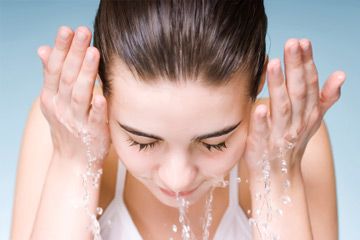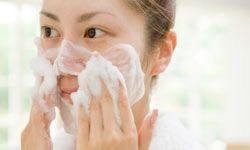You've likely heard the saying, "You are what you eat." And the same theory holds true for your skin: What you apply to your skin is absorbed directly into your body. Considering that the skin is your body's largest organ, it's crucial to know what you're putting into your system.
But if you've ever turned over the packaging of your favorite facial cleanser, you noticed a long list of ingredients you didn't recognize. From sulfates to parabens, the cosmetic industry uses all kinds of chemicals in its products—some are beneficial but others could be harmful. And many of them are not doing anything for your appearance and may even be making matters worse. Read on to get the dirt on five ingredients you should avoid in your face wash.
Advertisement
1. Sodium Lauryl Sulfate
You know that squeaky clean feeling you get after washing your face? That's due to sodium lauryl sulfate, a common ingredient added to face wash to make it foam, says Jody Levine, M.D., assistant clinical instructor of dermatology at Mount Sinai Hospital in New York City. "It's also common in many other personal care products, such as shampoo," she says. But it's not just found in the beauty aisle-—sodium lauryl sulfate is also used in car washes, garage floor cleaners and engine degreasers.
The problem with sodium lauryl sulfate is that it strips the skin (and scalp, in the case of shampoo) of natural oils that our skin actually needs for protection. "It can be very irritating, especially if a person is allergic to it," says Levine. Studies show that even modest amounts in products can cause allergic reactions [Paula's Choice]. What's more, because it removes the skin's natural, protective oil, the body ends up producing more oil (the very thing you're trying to get rid of) to compensate.
2. Fragrance
Back away from the floral-scented face wash! Look at the ingredients list of virtually any household product—from laundry detergent to face wash—and you'll see the word "fragrance." And while it sounds harmless enough, the word "fragrance" can represent hundreds of chemicals, many of which can cause allergies, asthma attacks, headaches and more. Plus, virtually all synthetic fragrances are stabilized with phthalates, a group of chemicals linked to reproductive problems and birth defects in animal studies [Source: EPA].
And the chemicals certainly aren't boosting the effectiveness of your face wash. "Added fragrances in cleansers tend to be irritating and can dry out the skin," says Levine. "It's best to avoid anything overly perfume-y or scented." Just can't live without fragrance? Opt for products that use essential oils or fruit and plant extracts to scent their solutions.
3. Oils
Many products contain petroleum and mineral oil-derived ingredients. Cosmetic companies love to use them because they're cheap, have no odor and never go bad. "Manufacturers may put this in cleansers as a hydration ingredient," says Levine. And while oil does indeed add moisture, certain types can clog pores leading to breakouts. Unless you have severely dry skin, Levine suggests using oil-free cleansers. Check the ingredients list and make sure the product has none of the following: Propylene Glycol, Parraffin, Mineral Oil, Butylene Glycol, Isopropyl Alcohol and Petrolatum. Instead, look for natural plant oils, which provide plenty of nourishment without clogging your pores.
4. Parabens
"Parabens are preservatives found in most cosmetics and skin care products," says Levine. They keep the product from spoiling by preventing harmful bacteria and fungi from growing inside it. The FDA does not regulate the use of parabens (or any other chemical) in beauty products, and currently they state that there is no reason for consumers to be concerned about the use of cosmetics containing parabens [Source: FDA].
However, some people disagree. Because parabens mimic estrogen, there has been fear that they may increase breast cancer risk. In fact, a 2004 study published in the Journal of Applied Toxicology detected parabens in breast tumors [Source: FDA]. However, the study did not show that parabens cause cancer, or that they are harmful to the body [Source: FDA]. "There is no concrete link between parabens and any dangerous medical conditions but some people may have a sensitivity and become irritated by the additive," says Levine. To steer clear of these additives, look for the word "paraben" on ingredients labels (it may appear as a suffix).
5. Alcohols
"Alcohols are often used as the base ingredient in many beauty products," says Levine. They are used for two reason: to make a thick skin-care product feel almost weightless and to help ingredients like retinol and vitamin C penetrate the skin more effectively [Source: Paula's Choice]. Alcohol does this by breaking down the skin's natural barrier.
It may help other ingredients work, but it can be very damaging to the skin, especially if your skin texture is fairly dry. "Alcohol is extremely drying and irritating since it strips the skin's natural barriers," says Levine. One study performed on hospital workers confirmed that regular cleansing with alcohol-based products erodes the skin's barrier [Source: Journal of Hospital Infection]. To keep your face healthy and hydrated, Levine says to avoid products with the following ingredients: isopropyl alcohol, SD alcohol 40 and ethyl alcohol.
Advertisement



